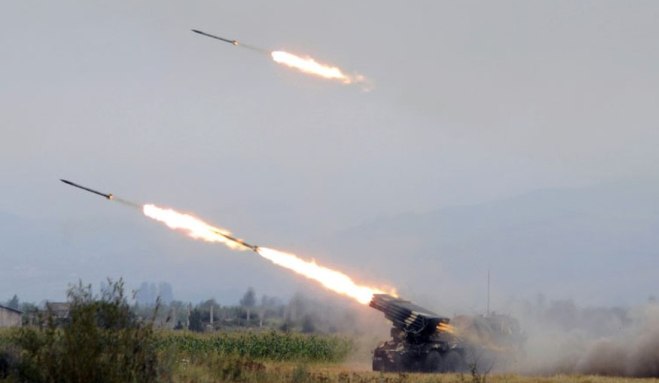International law and the Russian “occupation” of Abkhazia and South Ossetia, by Richard Berge

Georgian army rocket batteries firing on Ossetian cities and villages
Antigeopolitics -- In the aftermath of the 2008 August war and Russian recognition of Abkhazia and South Ossetia as independent states, Georgia has intensified its efforts to convince the world that these territories are being occupied by the Russian Federation. On the 28 of August 2008, just two days ofter the Russian recognition, the Georgian parliament passed a resolution to the effect that Abkhazia and South Ossetia were occupied territories. This was followed later in October the same year when Georgian president Mikhail Saakashvili approved the Law on Occupied Territories. Since then, resolutions to the effect that these territories are under Russian occupation have been put forward by several of Georgia’s closest allies, including Lithuania, the NATO parliamentary assembly, and most recently, in a draft resolution by the United States Congress on the 11th of May. However, the question remains how well the Georgian claim of Russian occupation confirms to international law and the actual facts on the ground. A preliminary analysis concludes that it does so poorly. First off, the Russian presence in Abkhazia and South Ossetia does not satisfy the definition of occupation set by the the Geneva Convention of 1907, article 42 which states that: “Territory is considered occupied when it is actually placed under the authority of the hostile army,” and article 43 which states that: “The authority of the legitimate power having in fact passed into the hands of the occupant, the latter shall take all the measures in his power to restore, and ensure, as far as possible, public order and safety, while respecting, unless absolutely prevented, the laws in force in the country.” In Abkhazia and South Ossetia authority is in fact placed in the hands of the de facto partially recognised authorities of the two breakaway territories, and not in the hands of the Russian military. The breakaway territories themselves have their own parliaments, governments, army, police force and other state institutions which are in charge of governance and the day to day running of their self-proclaimed republics
The authorities of both breakaway republics also enjoy broad legitimacy and support by the current populations of the respective territories, which overwhelmingly consider Russian troops to be liberators and allies, and not occupiers. Although the legitimacy of these de facto governments is disputed internationally, it is important to note that Abkhazia and South Ossetia are recognised as independent by four UN member states, Russia, Venezuela, Nicaragua and Nauru, and that international law does not specify a lower ceiling on the number of states recognising an entity before it can be considered a legitimate member of the international community. Russian troops in both territories do not exhibit the behavior characteristic of an occupying army either.
For example, the Russian troops in Abkhazia and South Ossetia do not patrol the streets or set up checkpoints to control the local population, and are mostly confined to their bases. Although limited housing projects for Russian troops and their families near the bases have been constructed, there is no construction of settlements or other forms of colonisation of Abkhazia and South Ossetia by ethnic Russians, akin to, for example, Israeli settlements in the West Bank. Russian control of the de facto borders of Abkhazia and South Ossetia is also not an arbitrary development, but has been negotiated in accordance with bilateral agreements between Moscow and the de facto authorities of the breakaway republics.
The decision of Georgia and some of its allies to recognise the breakaway republics as occupied by Russia is therefore wholly political, and does not have a particularly strong foundation in either international law or the actual facts on the ground. While the Georgian government hopes that its diplomatic effort to have these territories recognised as occupied will increase the pressure on Russia to withdraw its troops from both regions, the effort is mostly cosmetic, and unlikely to meet with much tangible success. The designation by Georgia and its Western allies of Abkhazia and South Ossetia as “occupied” is also designed to reinforce the Georgian narrative of the conflict of being exclusively between Georgia and Russia, and not with the Abkhazians and Ossetians. However, this approach will likely only contribute to the further objectification and alienation from Georgia of the populations of both territories, which will again hamper any real effort to reach a settlement in to these conflicts.
Source: Antigeopolitics
Richard Berge holds a BA in Politics and Georgian language from the School of Oriental and African Studies at University of London, and a MA in Politics, Security and Integration from the School of Slavonic and East European Studies at UCL. He has worked for the Norwegian Embassy in Baku, Azerbaijan in 2009 and the European Centre for Minority Issues in Tbilisi, Georgia in 2010, focusing on human rights, freedom of information and minority rights in both countries. He is currently looking to publish his MA thesis on the political situation of the Armenian minority in Abkhazia.